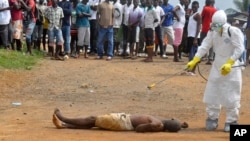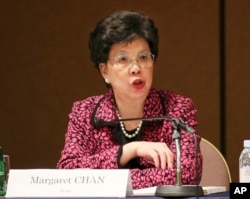Nearly 200 experts on Ebola are meeting in Switzerland to discuss possible cures and vaccines for the deadly disease, as the number of cases in West Africa continues to rise.
The World Health Organization says the two-day conference in Geneva is to review recent developments in possible treatments for Ebola and identify the most important actions that need to be taken.
On Thursday, the gathering’s opening day, the WHO called for drug companies and regulatory agencies to collaborate in speeding up development and access to promising, safe treatments to fight Ebola, Reuters reported.
No cure or vaccine exists for the deadly disease, although an experimental serum, ZMapp, made by a U.S. company, has been given to a small number of patients, some of whom have survived.
ZMapp is among 10 experimental treatments that are being investigated for their potential in combatting the virus and its effects, the WHO said in literature distributed at the conference’s start. They include eight drugs and "two promising candidate vaccines," Reuters quoted the document as saying.
Vaccines are being developed by at least three firms. Human safety trials are scheduled to begin soon on vaccines from GlaxoSmithKline Plc and NewLink Genetics, Reuters reported, adding that Johnson & Johnson on Thursday said it would begin clinical trials next year.
The West African Ebola outbreak this year has killed more than 1,900 people and infected at least 3,500, mostly in Guinea, Liberia and Sierra Leone, WHO Director General Margaret Chan said Wednesday.
Chan had called for more support from wealthier countries. On Thursday, France’s foreign ministry announced it would send 20 health and medical specialists to West Africa, with the first five departing for the Ebola-striken region on Friday.
Doctor's death adds to toll
On Thursday, Nigerian Minister of Health Onyebuchi Chukwu said the Ebola virus has killed seven in his country, including a doctor from the southern city of Port Harcourt who died August 22. At least 18 people have been infected in the country, whose 174 million people make this Africa's most populous nation.
The WHO said the doctor's case is important, because he continued to treat patients for three days after coming down with Ebola symptoms August 11. He had numerous contacts with friends and relatives who visited his house after the birth of a baby.
The U.N. agency warned that "the outbreak of Ebola virus disease in Port Harcourt has the potential to grow larger and spread faster" than the recent outbreak in Nigeria's largest city, Lagos.
Lagos experienced a small outbreak after a Liberian man with Ebola, Patrick Sawyer, flew into the city in late July. That outbreak was believed to be quickly contained, but the WHO said a man who had contact with Sawyer defied a quarantine and went to Port Harcourt, where he transmitted the virus to the doctor.
Nigeria's health minister said Thursday that authorities are monitoring nearly 300 people for Ebola symptoms.
An inadequate response
On Thursday, The New York Times reported that the World Health Organization’s response to the crisis had been “hobbled” by years of budget cuts.
“Its outbreak and emergency response units have been slashed, veterans who led previous fights against Ebola and other diseases have left, and scores of positions have been eliminated — precisely the kind of people and efforts that might have helped blunt the outbreak in West Africa before it ballooned into the worst Ebola epidemic ever recorded,” the newspaper reported.
On Wednesday, the United Nations said it would take at least $600 million to provide the supplies needed to contain and combat Ebola’s spread.
"We must fight Ebola because there is huge anxiety for our populations along with significant social and economic consequences," Younoussa Ballo, secretary-general of Guinea's health ministry, told Reuters at Thursday's talks in Geneva. "Research must be speeded up to have medicines to confront this epidemic."
U.S. health officials say the key to containing the outbreak will be increasing the number of Ebola treatment centers, providing protective equipment to health care workers and monitoring the contacts of those infected.
Many health workers in the affected areas of West Africa lack sufficient protective gear for treating patients, the Associated Press reported. Most of the gear must be destroyed after use.
A nurse in Monrovia, Liberia, told the AP she and her colleagues had cut up old uniforms and fashioned them into approximations of protective gear, cutting holes in the fabric to enable them to see. But the eye holes permit fumes from chlorine bleach to burn their eyes, said the nurse, whose name was not disclosed.
Health workers account for about 10 percent of Ebola deaths, the news service reported.
Health officials across West Africa have warned people to avoid contact with the body fluids of Ebola patients, including those killed by the disease.
Some information for this report was provided by The Associated Press and Reuters.






